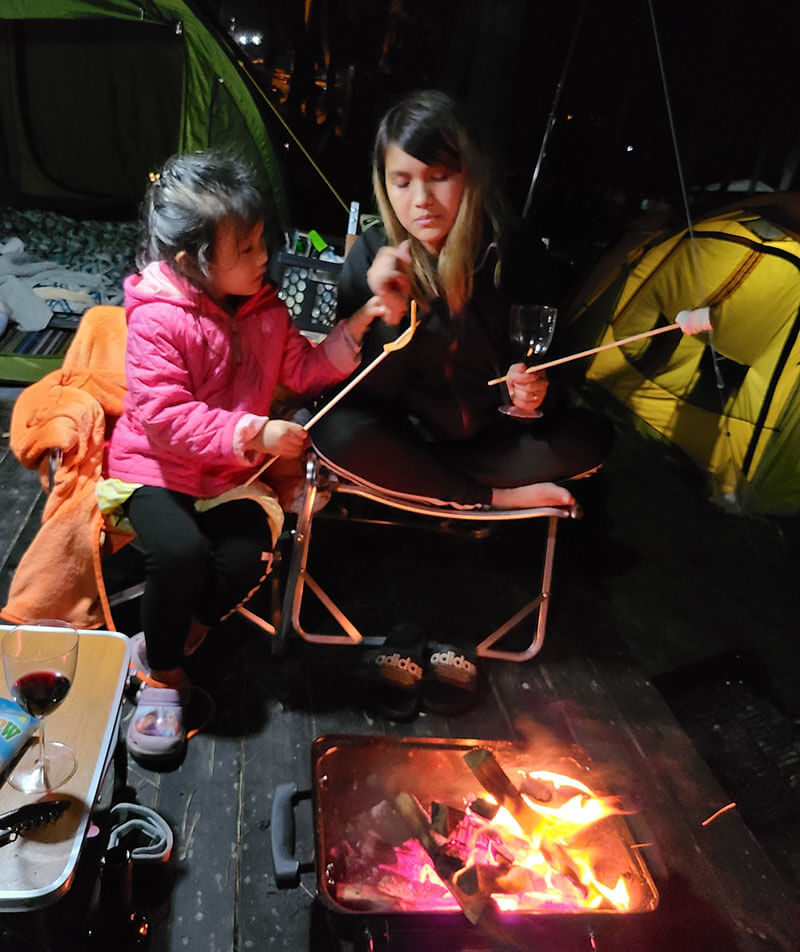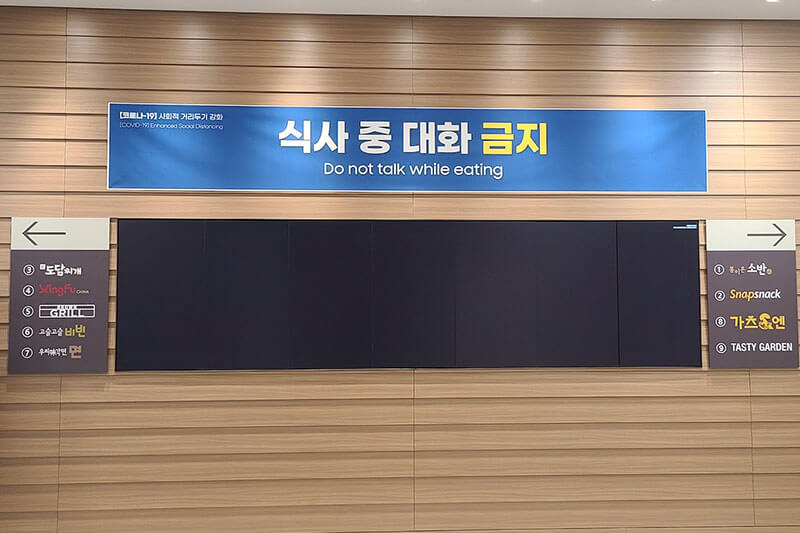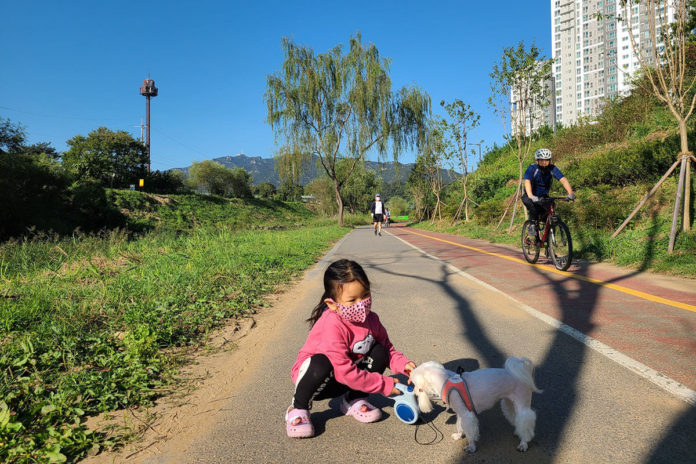This is taken from “Riding the Third Wave,” which looks at adoptees currently living in Korea and the effect of Korea’s social distancing level 2.5 on their professional and social lives.
—
Honestly, I rarely wore a mask before the pandemic. Even on the most polluted days, I wouldn’t. Not because it restricted my freedom or it was awkward to wear, no, simply because I never check the pollution level and am utterly unaware of the dangers hovering around my bodily openings every second I am outside. Unaware because I never had to consider this kind of threat in Denmark where I grew up.
Before the pandemic, I’d come to the office in the morning and see my colleagues wear masks as they entered, and it reminded me about the invisible “killer” lurking in the air just in front of my nose. But I still didn’t feel it. I couldn’t embrace this wear-a-mask-because-pollution-will-eventually-kill-you culture even when I rationally understood the danger. I wanted to, but I failed to remember every morning without exception.
The pandemic has made countries try to implement a mask-wearing culture like Korea, and they struggle. I get it! I struggle too! I can only imagine what it takes to make a whole nation remember masks every morning like they do in Korea.
Wearing a mask is not a big thing though, and it doesn’t affect my daily life. Everybody talks about it, but mostly because a part of the world outside of Korea seems to agree that masks violate our freedom, it makes us slaves to the government, it steals our oxygen and then kills us… kills us more than COVID they seem to believe.
Life goes on in Korea, and many things are not so different from before; some things are, of course.
We wonder whether the world will survive this – I mean, survive wearing a mask (because I’m pretty sure that humanity will survive the virus, but I’m not so sure about surviving the mask issue when I read the news from the US and Europe) – and we’re trying to enjoy life as a family here in Korea at the same time.
In the beginning, it was pretty tense here. Nobody knew anything, and the virus was spreading; going out felt like a real threat to myself and the people around me. We didn’t go to playgrounds, kids’ cafes, and shopping centers. We didn’t even discuss it, and it just felt natural to quit going to these public places with many people. But just staying home was not an option either.

My family loves getting out of the busy city and exploring beautiful nature, mountains, and rivers located just outside Seoul or even further away. All the experiences where you don’t have to re-breathe the air of 300 people standing in the same 20-square-meter room, fortunately for us! So this year, we took up camping. We’ve been talking about it for years, but now was the perfect chance to do it. It does take some preparation to go camping, so our weekend trips were usually simple trips to parks or similar locations.
Most of our life takes place in Seoul, so these little trips are mental oases that we need to re-charge after Seoul’s lightning-fast life has drained us. I love Seoul, but it’s a monster that lives off your soul. It will turn you into a suit-wearing zombie sooner than later if you don’t refuel your heart and mind now and then.
My wife and I have a flower shop. We cater mostly to foreigners who order online. We deliver the flowers within Seoul, Gyeonggi-do, and Incheon to boyfriends, girlfriends, mothers, and business relations. The pandemic also impacted our business, but we have been lucky and adjusting to the situation has been painless. Many are suffering though, just like most other countries. It’s evident in the streets with more empty shop windows than usual.
But most of our life is centered around work, kindergarten, and what to eat for dinner. My wife, our daughter, and I used to go out for dinner every Friday to celebrate another week done. There was this little budae jjigae (army stew) restaurant we often went to; the waitress was an ajumma in an inappropriately short skirt, chewing gum, and serving people with absolutely no desire to be there, yet it came to make us feel comfortable. Her absolute lack of interest and distant look was our hint of another week ending and the weekend ahead. Such things are gone now.
Now, instead of enjoying budae jjigae, we discuss what to do over the weekend. It takes time and more planning now compared to before the pandemic. There is a park featuring both a zoo and an amusement park only 10 minutes from our house. Conveniently near, but at times a bit busy and boring if we go there all the time.
Honestly, we feel bored quite often these days…or restless. Before the pandemic, there were so many things we could do that it was hard to choose. Now we have to put effort into finding fun family stuff to do, and it’s hard work! It’s hard to think of something new every weekend, make plans, check pollution forecasts (yeah, I do that now… sometimes).
In times of boredom, we tend to do impulsive things. We happened to see a pet store on the way home from a camping trip. We went in there like we did so many times before, but the difference was our hunger for excitement, changes, experiences… So we ended up buying a puppy and prevented ourselves from being able to enter the wonderful neighboring zoo as a pet is obviously a bad match with hundreds of semi-wild animals that all want to eat each other.
But, it’s a bit more fun now to stay home during the weekends.
When we do go camping, it is absolutely great. There is no pandemic on the beaches we sometimes camp by, nor is there a pandemic in the forest where we like to pitch our humble not-so-water-proof tent; it is a pure, pre-pandemic vacation feeling, and the amount of beautiful camping spots in Korea is countless!

Life always takes us back to the not-so-beautiful everyday-life in Seoul, where we have to wear masks. Even my daughter, Lily. She is 4. She is often teaching us the importance of wearing a mask. It’s a topic they apparently talk about often in kindergarten, called the “children’s house” in Korean.
Koreans love their children. So much that they will spend millions (of won) on their education every month without flinching, and sign them up for English classes, art classes, piano classes, math classes, science, and Taekwondo to make sure their kids won’t be bored from the minute they wake up to the minute they go to bed.
Naturally, the kindergartens are trying to cater to these loving parents by ensuring top safety. Lily’s kindergarten is no exception. This means no adult, except for the staff, is allowed entry; we hand over our children at the entrance, and before that, we fill out a form in which we are supposed to inform them about our whereabouts since we left kindergarten the day before. A teacher opens the door, just enough to let Lily in. Maybe this is done to make sure I don’t sneak in with her… I don’t know if that happens a lot?!
The teacher checks her temperature on the forehead with a handheld thermometer. Lily gets into the entrance area, takes off her shoes, and walks to the heat sensing flir-like (thermal camera) setup, which looks like a robot that has been scaled down to match a 4-year-old’s height. It has a big tablet-like display on the front and a camera that captures your face as you approach. There is a circle on the display, and you have to align your face with the circle so that it can accurately do another temperature check. Once done, it will loudly inform you, in a robotic voice, that your temperature has been checked. Then you can pass. I’ve never seen what happens if your temperature is too high, but I can imagine that it will inform you in a way that nobody within a 1-kilometer radius will be in doubt.
I continue going to my office where I meet a similar setup. Like before entering Lily’s kindergarten, I have to fill out a form, informing the Corona-team at my workplace about my whereabouts since the day before. If I don’t, the gate will loudly and very non-discretely reject my access, and five security guards will make sure that I understand. Fortunately, they know that people forget and have put up a helpdesk where they will let you fill out the form so that you can gain access and get to work. Did I mention that they also have two different heat-sensing arrangements at the gate to make sure you don’t have a fever before entering?
I hardly remember the time before this, and I can’t imagine the gate without this. I’m more like, why not? I’m happy to know that nobody around me is sick, whether it’s COVID, the regular flu, or just a cold. And I don’t feel violated by them taking my temperature. I assume that in Denmark, they would do this with one of the old-school anal things in front of all the people, and that must be the reason why they feel so violated by something like this. Otherwise, I don’t get it…

Working at my desk is not so different, but lunch has become less social. We do go together, but the tables are divided by a large transparent plexiglass wall. In the middle of the glass is a big sticker that says “Don’t talk”. We talk anyway, and so does everybody else. We talk extra loudly to penetrate the plexiglass, but there are fewer people around us than pre-pandemic times because we have lunch shifts to avoid too many people gathered at the same time. After lunch, we sometimes grab a cup of coffee in one of the many not-cheap coffee joints outside our office. Except for everybody wearing masks, it feels very non-pandemic.
After work comes our biggest struggle; what to eat for dinner. Like any other family, whether you live in Korea, Sweden, or Brazil, deciding what to eat for dinner is the most difficult part of life. Fortunately, Korea might have the most well-developed delivery service in the universe, and the pandemic has made delivery an even more attractive option compared to going out for dinner or even to the supermarket. We still have to agree on what to eat for dinner though, so some things remain the same despite the pandemic.
Christmas is coming, and for us who grew up with Christmas, it does feel a bit anticlimactic to celebrate it this year. I’m sure Koreans don’t feel much change in this regard.
Our daughter is mostly focused on the gifts, but she doesn’t have that many years of Christmas experience to compare it with, so she is probably just thinking that this is how Christmas is supposed to be. She might be disappointed when she experiences her first non-pandemic Christmas Eve, with hours of eating, chatting, and doing time-consuming boring adult things before getting to the gift part. This year will be fast and efficient, exactly like kids like it.
We’re facing winter now; normally a season where kids cafes are very successful, but they are absolutely a no-go during the pandemic. Summer was easy to get through, but winter is different…
Indoor activities in Korea often involve an unreasonable amount of people gathered in tiny places, or maybe it’s just the amount of people that makes any place look tiny, but not very pandemic-friendly either way.
We’re thinking hard every weekend, but the reality is probably that winter is just going to feel longer than usual and we’re going to spend more time at home. But home is not bad at all; after all, it’s the place where the people you love the most live.












